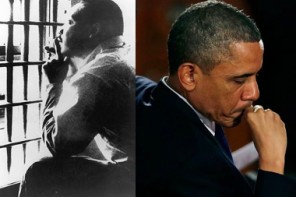
Reading this Greg Sargent post yesterday, about the many ways the Obama campaign is laying out a “values” argument for reelection, I thought, “oh, no. Not values.”
Mind you Obama is not himself using the word “values;” in fact, the main Washington Post article Sargent cites focuses on Obama’s new-found aggressiveness directed at political adversaries. At one point the piece notes, “Obama has begun to frame the 2012 contest as a referendum on values,” highlighting in particular his criticism of Rick Perry’s global warming denialism, the refusal of Republicans to denounce the booing of a gay soldier at a debate, and a speech to the LGBT rights group the Human Rights Campaign. But Sargent interprets all this through a nice versus mean prism: “By linking his taxes-and-jobs argument to the crude outbursts at GOP debates, Obama is trying to build a larger contrast between the charitable, inclusive vision he’s fighting for and a fundamentally mean-spirited, exclusionary one he’s implicitly accusing the GOP of harboring.”
But focusing on “values” is an effort to deflect the perceived Republican monopoly on the word and the idea. (The Values Voters Summit, the annual religious right confab where the GOP presidential candidates will each try to break out of a stagnated field by winning the straw poll, begins tomorrow in Washington.) Claiming that the Democrats’ values are better, or that they represent what Jesus really meant, is very 2006, very 2008: a response to the media frenzy over the “values voters” supposedly deciding the 2004 election over their opposition to abortion and gay marriage and their commitment to the mythology of a Christian nation.
I suspect it won’t work in 2012.
Here’s why: what’s happening on the ground beneath the president’s feet is about “values,” sure. But voters don’t want to hear about values, they want to hear about justice. They don’t want to hear “we’re the nice Christians, they’re the nasty ones,” or be treated to a “charitable, inclusive vision” versus a “fundamentally mean-spirited, exclusionary one.” They want a vision that will fundamentally reform—not just reform, but undo and remake—a financial system that has, in the mantra of the Occupy movement, reaped huge rewards for 1% to the detriment of the 99%. That means the undoing of the collusion between K Street and Wall Street.
A vision has to go way, way beyond talking about the federal budget as a “moral document,” or merely urging Congress not to cut programs that serve the poor and middle class. The prevailing, well-intentioned religious advocacy on economic issues of late has gone something like this missive I received earlier this week: the Church World Service organized Capitol Hill call-in days, urging supporters to call their members of Congress “and ask for a faithful budget that preserves the dignity and protects the well-being of God’s most vulnerable children, women and men.” The suggested talking points included:
As a person of faith, I am concerned that the federal budget negotiations are putting the most vulnerable peoples’ dignity and livelihood in peril. I believe that faith and fairness require that we preserve and strengthen vital lifelines for vulnerable and impoverished people in the U.S. and abroad. This is a struggle for the soul of America and its moral conscience. Congress should not cut humanitarian and poverty-focused foreign assistance or U.S. domestic poverty programs. The faithful way forward to fiscal health calls for a focus on job creation, revenue increases, reducing unnecessary military spending and a shared commitment to the common good.
As I wrote back in April, while faithy leaders who have the ear of the White House were fasting for a “moral” budget, although Democrats do need to fight to maintain such programs, they need to do more, and they need to do much, much more than pay homage to the common good. They need to, as E.J. Dionne put it at the time, “embrace Obama’s historic obligation — and opportunity — to win the most important struggle over the role of government since the New Deal.”
The Occupy movement is starting to get religious support; at yesterday’s march in New York, local faith leaders joined, as did a contingent of students from Union Theological Seminary. In DC, though, where the symbolic power of “holding space for the 99% to come and gather” on K Street is undeniable, there’s yet to be a groundswell of religious leaders or clergy showing up at the protests or even speaking about them. “I’m still optimistic that the further it goes, the less they’re able to ignore it,” the Rev. Brian Merritt told me at McPherson Square yesterday. “Especially in a place like DC with a huge young adult population. I mean, these are going to start being your members.”


